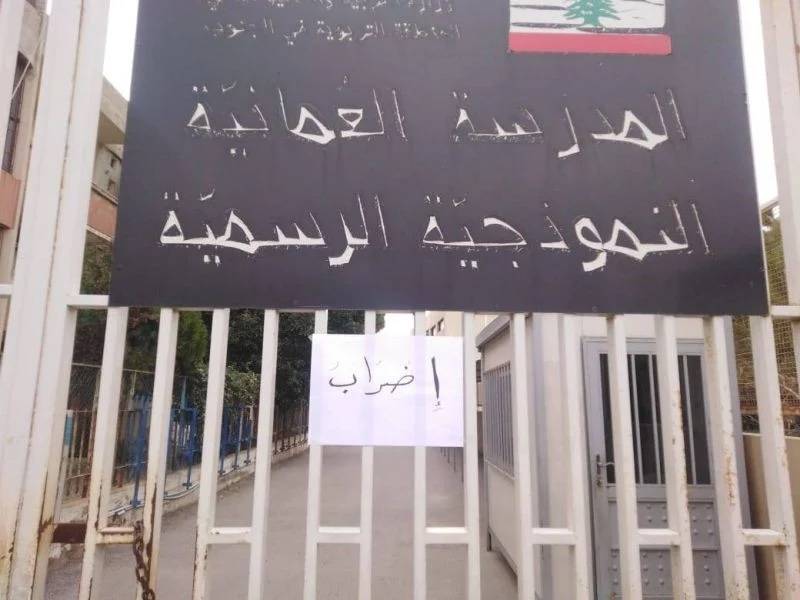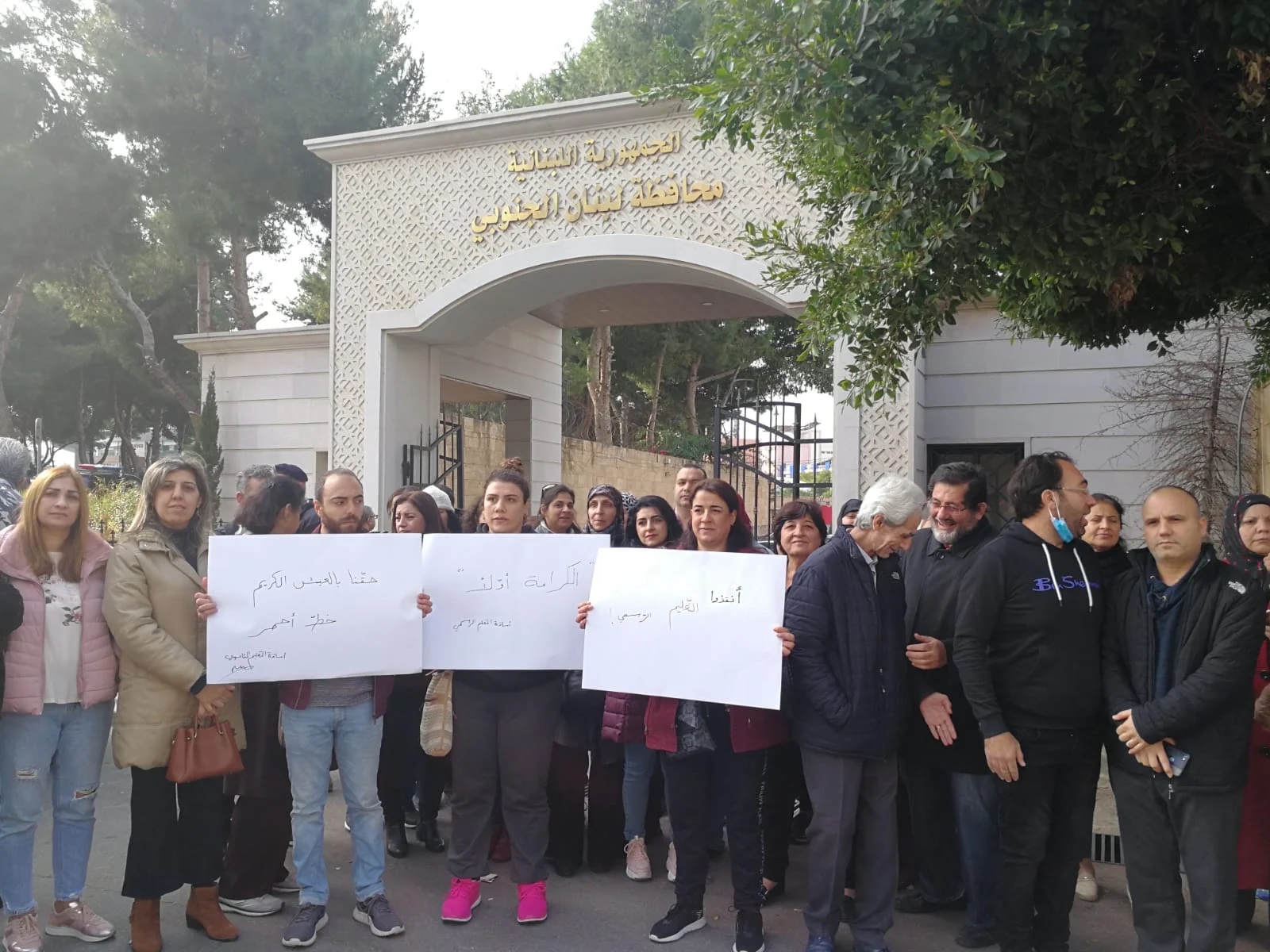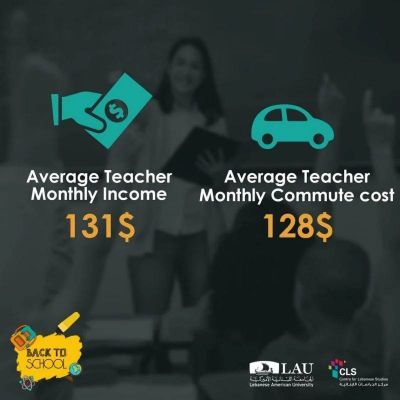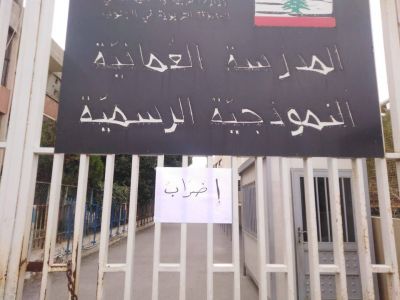
“Strike” is it written on a sign attached to the gate of a public establishment. (Credit: Mountasser Abdallah)
It was the last straw: at the beginning of the academic year’s second term, caretaker Education Minister Abbas Halabi decided to grant public school teachers an extra $5 per working day. For many, this move made it feel as if their work was only worth $5 a day. And this anger was demonstrated when many, but not all, teachers went on strike on Monday, the first school day after the Christmas and end-of-year holidays. The teachers’ announced a weeklong strike, threatening that it would be even longer if their demands go unmet.
As a result, public sector teachers have been on strike since Tuesday and will remain so throughout the week. This strike comes in protest against the erosion of their salaries’ purchasing power, against the backdrop of the continuous collapse of the Lebanese lira since September 2019, but also against the authorities’ empty promises. In particular, they are demanding a realistic revision of their salaries, accompanied by monthly foreign currency aid paid in cash to enable them to survive until the current financial crisis is resolved. They are also demanding better health care coverage, higher transport allowances and a review of the status of contract and casual workers.
 In South Lebanon, public school teachers are determined to continue the strike. (Credit: Mountasser Abdallah)
In South Lebanon, public school teachers are determined to continue the strike. (Credit: Mountasser Abdallah)
Between LL6 million and LL11 million
While their salaries have been adjusted since the beginning of the Lebanon’s economic crisis and are now three times what they were in 2019, teachers continue to suffer from the lira’s depreciation, in the face of an irrevocable fall of the national currency.
“Since the adjustments were made, the salary of a secondary school teacher in the public sector varies between LL6 million and LL11 million,” said Moulouk Mehrez, who recently resigned as head of the public secondary school teachers’ union. “With a dollar [trading] at LL46,000 [on the parallel market] and without a supplement in fresh currency, it is far from being enough to lead a decent life,” she added.
The teachers’ strike prompted Halabi to backtrack and cancel the $5 per diem, while being apologetic for having unintentionally offended them. The minister even invited them to a dialogue, to try to find a way out of the crisis. But this appeared to only further fuel their anger, justified by the minister’s sometimes contradictory promises.
“At the beginning of the school year, he had promised compensation of $130 per month, while last year he failed to keep his promise to pay the teachers $90, especially the contract teachers. Worse still, at the beginning of this semester, he took a clear step backwards, proposing $5 per working day,” said Nisrine Chahine, head of the contract and occasional teachers’ union.
L’Orient-Le Jour tried multiple times to reach the education minister for comment but without success.
“In a bid to show the teachers his goodwill and his concern to find a solution to their difficult situation, Abbas Halabi invited them to participate in a meeting on Tuesday with [caretaker] Prime Minister Najib Mikati, initially devoted to listening to the demands of Nehme Mahfoud, president of Union of Private School Teachers,” an informed source revealed on condition of anonymity.
This call was rejected by the public school unionists, who emphasized their claims and said that they are fed up with empty promises.
“The official education unions will not attend the meeting with the prime minister, after many visits and empty promises from his end. We therefore call on Mr. Mikati to find quick solutions that would allow teachers to return to school,” Hussein Jawad, president of the League of Public Basic Education Teachers, told L’Orient-Le Jour. He called for a sit-in on Wednesday at 11 a.m. in front of the Education Ministry.
Disagreements within the unions
The deadlock is now total. Beyond this difficult dialogue between the education minister and public school teachers, there are a whole series of obstacles linked to the Lebanese crisis, the collapse of a bankrupt state, the unfulfilled promises the political class has made the workers, the eroded trust between the authorities and the international community due to bad governance, and finally the malaise that is emerging within the traditional unions, pushing many unionists teachers to rise up against their leaders.
The latter, often close to traditional political parties, tried to bring the strikers back to their classrooms.
“I resigned from the presidency of the union,” Mehrez said. “I was not only attacked, but insulted and humiliated,” she added.
Nisrine Chahine says that two other public school teachers’ unions were also rocked by resignations.
“The traditional unions are close to the ruling parties. Their representatives tried to convince disgruntled teachers, sometimes through threats, to resume classes normally, without even having fought for their rights,” Chahine said. “As a result, these teachers rebelled against the union leaders. They immediately joined the strikers. Their leaders had no choice but to call for a strike.”
It is in this context that the minister has made the decision to halt public schools’ afternoon classes reserved for Syrian refugee students — for which teachers are paid separately — for as long as Lebanese students do not have access to classrooms due to the ongoing strike.
“Minister Halabi is doing his best,” the aforementioned informed source said. “This is because the state’s coffers are empty. Moreover, the international community refuses to support the Lebanese authorities in the absence of the reforms expected by the International Monetary Fund. This measure is the only way to encourage the international community to mobilize for the sake of the public sector’s students who have so far benefited from only two months of education [this academic year].”
This article was originally published in French in L'Orient-Le Jour. Translation by Joelle El Khoury.

